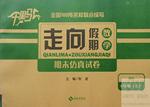题目内容
The new classroom will be constructed this year, and a firm from Korea has been chosen to ______ the work.
A. assign B. provide C. undertake D. settle
练习册系列答案
 千里马走向假期期末仿真试卷寒假系列答案
千里马走向假期期末仿真试卷寒假系列答案
相关题目
题目内容
The new classroom will be constructed this year, and a firm from Korea has been chosen to ______ the work.
A. assign B. provide C. undertake D. settle
 千里马走向假期期末仿真试卷寒假系列答案
千里马走向假期期末仿真试卷寒假系列答案